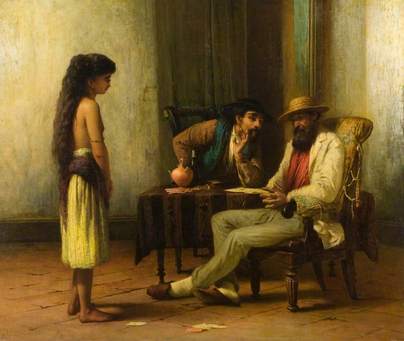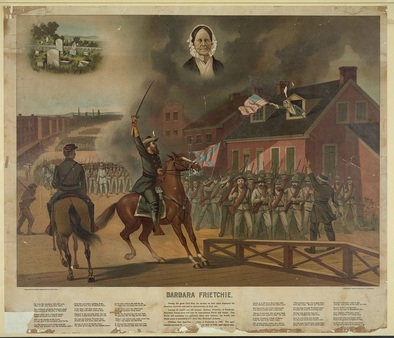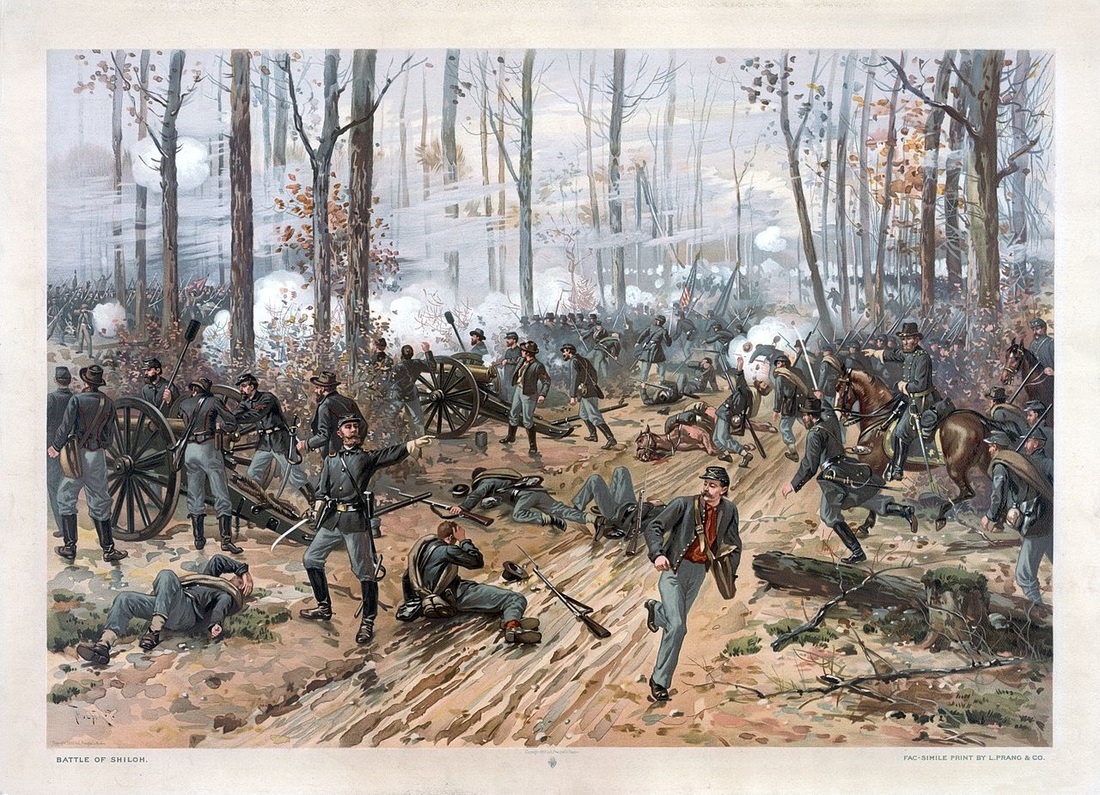Various War-time Poems
In general, the Romantic poets, as a group, stopped writing poems in quantity and quality. The Literary Romanticism movement was shattered by the Civil War. It was wounded at the First Battle of Bull Run and killed at Shiloh. Many poets, especially the Fireside Poets, turned to prose as their medium of expression, for the most part rejecting poetry. They did write some poetry, but their major outputs were in the forms of non-fiction prose or translations of older texts like Homer and Chaucer. Interestingly, the prose writers, particularly Melville, turned to poetry as their medium. Most turned away from the war as their topics, with the major exceptions of Melville and Whittier.
An interesting thing takes place with Melville's poetry: it is extraordinarily good. Other then Walt Whitman's, Melville's war-time poetry is superb. His poetry has received much attention with the 150th anniversary of the Civil War. Many scholars, including myself, consider the collected Civil War poems as the 2nd best volume of war poetry ever written by an American.
However, they did write some poetry with differing degrees of success.
An interesting thing takes place with Melville's poetry: it is extraordinarily good. Other then Walt Whitman's, Melville's war-time poetry is superb. His poetry has received much attention with the 150th anniversary of the Civil War. Many scholars, including myself, consider the collected Civil War poems as the 2nd best volume of war poetry ever written by an American.
However, they did write some poetry with differing degrees of success.
|
|
From Poems on Slavery
Note: A quadroon is a person who has one grandparent of African descent; all other grandparents are white; nevertheless, she is considered a slave if her mother, regardless of race, is also a slave. It is not well known that significant numbers of slaves were White and Native American.
Note: A quadroon is a person who has one grandparent of African descent; all other grandparents are white; nevertheless, she is considered a slave if her mother, regardless of race, is also a slave. It is not well known that significant numbers of slaves were White and Native American.
Barbara Frietchie
John Greenleaf Whittier
During the failed invasion of Maryland by the Confederate Army under the command of Robert E. Lee, troops under the command of the volatile general Stonewall Jackson passed through Frederick, Maryland. The story goes that the 95 year old Barbara Frietichie defiantly waved her American flag and dared Jackson's troops to remove it. Jackson, admiring her courage, age, gender and patriotism, ordered her to be left in peace. Much debate rages on the historical accuracy of the poem. However, by nearly all records, the actions of both Stonewall Jackson and Barbara Frietchie is consistent to their personalities.
During the failed invasion of Maryland by the Confederate Army under the command of Robert E. Lee, troops under the command of the volatile general Stonewall Jackson passed through Frederick, Maryland. The story goes that the 95 year old Barbara Frietichie defiantly waved her American flag and dared Jackson's troops to remove it. Jackson, admiring her courage, age, gender and patriotism, ordered her to be left in peace. Much debate rages on the historical accuracy of the poem. However, by nearly all records, the actions of both Stonewall Jackson and Barbara Frietchie is consistent to their personalities.
|
Shiloh
A Requiem by Herman Melville Skimming lightly, wheeling still, The swallows fly low Over the field in clouded days, The forest-field of Shiloh--- Over the field where April rain Solaced the parched ones stretched in pain Through the pause of night That followed the Sunday fight Around the church of Shiloh--- The church so lone, the log-built one, That echoed to many a parting groan And natural prayer Of dying foemen mingled there--- Foemen at morn, but friends at eve--- Fame or country least their care: (What like a bullet can undeceive!) But now they lie low, While over them the swallows skim, And all is hushed at Shiloh. From Project Guttenberg.org |
The Battle of Shiloh, in Tennessee, took place on 6-7 April 1862. Casualty levels were unprecedented: the 3500 men who died there amounted to more than the United States had lost in the Revolutionary War, the War of 1812 and the Mexican War combined.
As befits its subtitle, Herman Melville's 'requiem' is remarkably non-partisan. Both sides seem to have been deceived; how modern that parenthetical line sounds, both in tone and sentiment. Melville gives the fatally wounded the opportunity to overcome their enmity. Americans all, they live as foe and die as friends: the schisms of civil war are healed in deaths which transform churchyard into graveyard. That the battlefield should have been a site of Christian worship emphasises the appalling costs of this fratricide as well as the possibilities for its redress. Courtesy of Tim Kendell, Professor of English, U of Exeter, UK. |
|
Boston Hymn (1863)
Ralph Waldo Emerson A Commemoration of Lincoln's Emancipation Proclamation The word of the Lord by night To the watching Pilgrims came, As they sat by the seaside, And filled their hearts with flame. God said, I am tired of kings, I suffer them no more; Up to my ear the morning brings The outrage of the poor. Think ye I made this ball A field of havoc and war, Where tyrants great and tyrants small Might harry the weak and poor? My angel, his name is Freedom,-- Choose him to be your king; He shall cut pathways east and west, And fend you with his wing. Lo! I uncover the land Which I hid of old time in the West, As the sculptor uncovers the statue When he has wrought his best; I show Columbia, of the rocks Which dip their foot in the seas, And soar to the air-borne flocks Of clouds, and the boreal fleece. I will divide my goods; Call in the wretch and slave: None shall rule but the humble, And none but Toil shall have. I will have never a noble, No lineage counted great; Fishers and choppers and ploughmen Shall constitute a state. Go, cut down trees in the forest, And trim the straightest boughs; Cut down the trees in the forest, And build me a wooden house. Call the people together, The young men and the sires, The digger in the harvest field, Hireling, and him that hires; And here in a pine state-house They shall choose men to rule In every needful faculty, In church, and state, and school. From the Public Domain |
Lo, now! if these poor men Can govern the land and sea, And make just laws below the sun, As planets faithful be. And ye shall succour men; 'T is nobleness to serve; Help them who cannot help again: Beware from right to swerve. I break your bonds and masterships, And I unchain the slave: Free be his heart and hand henceforth As wind and wandering wave. I cause from every creature His proper good to flow: As much as he is and doeth, So much he shall bestow. But laying hands on another To coin his labour and sweat, He goes in pawn to his victim For eternal years in debt. To-day unbind the captive, So only are ye unbound; Lift up a people from the dust, Trump of their rescue, sound! Pay ransom to the owner, And fill the bag to the brim. Who is the owner? The slave is owner, And ever was. Pay him. O North! give him beauty for rags, And honour, O South! for his shame; Nevada! coin thy golden crags With Freedom's image and name. Up! and the dusky race That sat in darkness long,-- Be swift their feet as antelopes, And as behemoth strong. Come, East and West and North, By races, as snow-flakes, And carry my purpose forth, Which neither halts nor shakes. My will fulfilled shall be, For, in daylight or in dark, My thunderbolt has eyes to see His way home to the mark. Although his output decreased, along with the onset of dementia, The Grand Old Man still possessed the fire, resolve, and faith which drove his previous works. |



